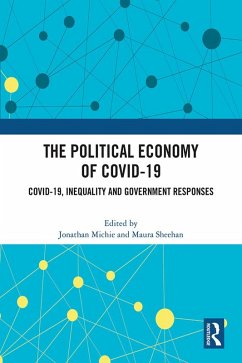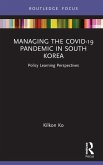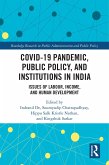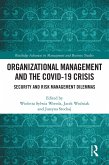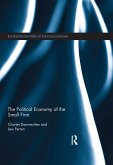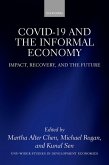The Political Economy of Covid-19 (eBook, PDF)
Covid-19, Inequality and Government Responses
Redaktion: Michie, Jonathan; Sheehan, Maura
42,95 €
42,95 €
inkl. MwSt.
Sofort per Download lieferbar

21 °P sammeln
42,95 €
Als Download kaufen

42,95 €
inkl. MwSt.
Sofort per Download lieferbar

21 °P sammeln
Jetzt verschenken
Alle Infos zum eBook verschenken
42,95 €
inkl. MwSt.
Sofort per Download lieferbar
Alle Infos zum eBook verschenken

21 °P sammeln
The Political Economy of Covid-19 (eBook, PDF)
Covid-19, Inequality and Government Responses
Redaktion: Michie, Jonathan; Sheehan, Maura
- Format: PDF
- Merkliste
- Auf die Merkliste
- Bewerten Bewerten
- Teilen
- Produkt teilen
- Produkterinnerung
- Produkterinnerung

Bitte loggen Sie sich zunächst in Ihr Kundenkonto ein oder registrieren Sie sich bei
bücher.de, um das eBook-Abo tolino select nutzen zu können.
Hier können Sie sich einloggen
Hier können Sie sich einloggen
Sie sind bereits eingeloggt. Klicken Sie auf 2. tolino select Abo, um fortzufahren.

Bitte loggen Sie sich zunächst in Ihr Kundenkonto ein oder registrieren Sie sich bei bücher.de, um das eBook-Abo tolino select nutzen zu können.
This comprehensive book brings together research published during 2021 analysing the impact of the Covid-19 pandemic on the economy - on output and employment, on inequality, and on public policy responses.
- Geräte: PC
- mit Kopierschutz
- eBook Hilfe
Andere Kunden interessierten sich auch für
![Managing the COVID-19 Pandemic in South Korea (eBook, PDF) Managing the COVID-19 Pandemic in South Korea (eBook, PDF)]() Kilkon KoManaging the COVID-19 Pandemic in South Korea (eBook, PDF)21,95 €
Kilkon KoManaging the COVID-19 Pandemic in South Korea (eBook, PDF)21,95 €![COVID-19 Pandemic, Public Policy, and Institutions in India (eBook, PDF) COVID-19 Pandemic, Public Policy, and Institutions in India (eBook, PDF)]() COVID-19 Pandemic, Public Policy, and Institutions in India (eBook, PDF)44,95 €
COVID-19 Pandemic, Public Policy, and Institutions in India (eBook, PDF)44,95 €![Organizational Management and the COVID-19 Crisis (eBook, PDF) Organizational Management and the COVID-19 Crisis (eBook, PDF)]() Organizational Management and the COVID-19 Crisis (eBook, PDF)42,95 €
Organizational Management and the COVID-19 Crisis (eBook, PDF)42,95 €![COVID-19 and Entrepreneurship (eBook, PDF) COVID-19 and Entrepreneurship (eBook, PDF)]() COVID-19 and Entrepreneurship (eBook, PDF)40,95 €
COVID-19 and Entrepreneurship (eBook, PDF)40,95 €![The Political Economy of the Small Firm (eBook, PDF) The Political Economy of the Small Firm (eBook, PDF)]() Charles DannreutherThe Political Economy of the Small Firm (eBook, PDF)30,95 €
Charles DannreutherThe Political Economy of the Small Firm (eBook, PDF)30,95 €![The COVID-19 Pandemic and the Future of Working Spaces (eBook, PDF) The COVID-19 Pandemic and the Future of Working Spaces (eBook, PDF)]() The COVID-19 Pandemic and the Future of Working Spaces (eBook, PDF)0,00 €
The COVID-19 Pandemic and the Future of Working Spaces (eBook, PDF)0,00 €![COVID-19 and the Informal Economy (eBook, PDF) COVID-19 and the Informal Economy (eBook, PDF)]() COVID-19 and the Informal Economy (eBook, PDF)88,95 €
COVID-19 and the Informal Economy (eBook, PDF)88,95 €-
-
-
This comprehensive book brings together research published during 2021 analysing the impact of the Covid-19 pandemic on the economy - on output and employment, on inequality, and on public policy responses.
Dieser Download kann aus rechtlichen Gründen nur mit Rechnungsadresse in A, B, BG, CY, CZ, D, DK, EW, E, FIN, F, GR, HR, H, IRL, I, LT, L, LR, M, NL, PL, P, R, S, SLO, SK ausgeliefert werden.
Produktdetails
- Produktdetails
- Verlag: Taylor & Francis eBooks
- Seitenzahl: 356
- Erscheinungstermin: 18. August 2022
- Englisch
- ISBN-13: 9781000637748
- Artikelnr.: 64096902
- Verlag: Taylor & Francis eBooks
- Seitenzahl: 356
- Erscheinungstermin: 18. August 2022
- Englisch
- ISBN-13: 9781000637748
- Artikelnr.: 64096902
- Herstellerkennzeichnung Die Herstellerinformationen sind derzeit nicht verfügbar.
Jonathan Michie is Professor of Innovation and Knowledge Exchange at the University of Oxford, where he is also President of Kellogg College. He is the managing editor of the International Review of Applied Economics, and Chair of the Universities Association for Lifelong Learning. Maura Sheehan is Professor of International Management at Edinburgh Napier University. She is Associate Editor of the International Review of Applied Economics and Editor in Chief of the Journal of Organisational Effectiveness: People and Performance (JOEPP).
Introduction: Building back better? Part 1: Causes, Effects and Impact of
the COVID-19 Crisis 1. Organizational participation in post-covid society:
its contributions and enabling conditions 2. The psychological consequences
of COVID-19 lockdowns 3. COVID-19: effectiveness of socioeconomic factors
in containing the spread and mortality 4. Is there a shift contagion among
stock markets during the COVID-19 crisis? Further insights from TYDL
causality test 5. Health risk and the efficient market hypothesis in the
time of COVID-19 6. Behavioral finance and market efficiency in the time of
the COVID-19 pandemic: does fear drive the market? 7. Analysis of
containment measures and economic policies arising from COVID-19 in the
European Union 8. Covid 19: Ramifications for progress towards the
sustainable development goals (SDGs) in Nigeria 9. The political risk
factors of COVID-19 10. A green new deal and debt sustainability for the
post COVID-19 world 11. COVID-19 and the Chinese economy: impacts, policy
responses and implications Part 2: Covid-19, Inequality, and Government
Responses 12. The 'Great Reset' to tackle Covid-19 and other crises 13. The
Covid-19 pandemic and economic stimulus in India: has it been a hostage of
macroeconomic complications? 14. Accounting for global value chains: rising
global inequality in the wake of COVID-19? 15. Impact of pandemics on
income inequality: lessons from the past 16. The Korean government's public
health responses to the COVID-19 epidemic through the lens of industrial
policy 17. The impact of COVID-19 on the Indian economy 18. An empirical
analysis of COVID-19 response: comparison of US with the G7
the COVID-19 Crisis 1. Organizational participation in post-covid society:
its contributions and enabling conditions 2. The psychological consequences
of COVID-19 lockdowns 3. COVID-19: effectiveness of socioeconomic factors
in containing the spread and mortality 4. Is there a shift contagion among
stock markets during the COVID-19 crisis? Further insights from TYDL
causality test 5. Health risk and the efficient market hypothesis in the
time of COVID-19 6. Behavioral finance and market efficiency in the time of
the COVID-19 pandemic: does fear drive the market? 7. Analysis of
containment measures and economic policies arising from COVID-19 in the
European Union 8. Covid 19: Ramifications for progress towards the
sustainable development goals (SDGs) in Nigeria 9. The political risk
factors of COVID-19 10. A green new deal and debt sustainability for the
post COVID-19 world 11. COVID-19 and the Chinese economy: impacts, policy
responses and implications Part 2: Covid-19, Inequality, and Government
Responses 12. The 'Great Reset' to tackle Covid-19 and other crises 13. The
Covid-19 pandemic and economic stimulus in India: has it been a hostage of
macroeconomic complications? 14. Accounting for global value chains: rising
global inequality in the wake of COVID-19? 15. Impact of pandemics on
income inequality: lessons from the past 16. The Korean government's public
health responses to the COVID-19 epidemic through the lens of industrial
policy 17. The impact of COVID-19 on the Indian economy 18. An empirical
analysis of COVID-19 response: comparison of US with the G7
Introduction: Building back better? Part 1: Causes, Effects and Impact of
the COVID-19 Crisis 1. Organizational participation in post-covid society:
its contributions and enabling conditions 2. The psychological consequences
of COVID-19 lockdowns 3. COVID-19: effectiveness of socioeconomic factors
in containing the spread and mortality 4. Is there a shift contagion among
stock markets during the COVID-19 crisis? Further insights from TYDL
causality test 5. Health risk and the efficient market hypothesis in the
time of COVID-19 6. Behavioral finance and market efficiency in the time of
the COVID-19 pandemic: does fear drive the market? 7. Analysis of
containment measures and economic policies arising from COVID-19 in the
European Union 8. Covid 19: Ramifications for progress towards the
sustainable development goals (SDGs) in Nigeria 9. The political risk
factors of COVID-19 10. A green new deal and debt sustainability for the
post COVID-19 world 11. COVID-19 and the Chinese economy: impacts, policy
responses and implications Part 2: Covid-19, Inequality, and Government
Responses 12. The 'Great Reset' to tackle Covid-19 and other crises 13. The
Covid-19 pandemic and economic stimulus in India: has it been a hostage of
macroeconomic complications? 14. Accounting for global value chains: rising
global inequality in the wake of COVID-19? 15. Impact of pandemics on
income inequality: lessons from the past 16. The Korean government's public
health responses to the COVID-19 epidemic through the lens of industrial
policy 17. The impact of COVID-19 on the Indian economy 18. An empirical
analysis of COVID-19 response: comparison of US with the G7
the COVID-19 Crisis 1. Organizational participation in post-covid society:
its contributions and enabling conditions 2. The psychological consequences
of COVID-19 lockdowns 3. COVID-19: effectiveness of socioeconomic factors
in containing the spread and mortality 4. Is there a shift contagion among
stock markets during the COVID-19 crisis? Further insights from TYDL
causality test 5. Health risk and the efficient market hypothesis in the
time of COVID-19 6. Behavioral finance and market efficiency in the time of
the COVID-19 pandemic: does fear drive the market? 7. Analysis of
containment measures and economic policies arising from COVID-19 in the
European Union 8. Covid 19: Ramifications for progress towards the
sustainable development goals (SDGs) in Nigeria 9. The political risk
factors of COVID-19 10. A green new deal and debt sustainability for the
post COVID-19 world 11. COVID-19 and the Chinese economy: impacts, policy
responses and implications Part 2: Covid-19, Inequality, and Government
Responses 12. The 'Great Reset' to tackle Covid-19 and other crises 13. The
Covid-19 pandemic and economic stimulus in India: has it been a hostage of
macroeconomic complications? 14. Accounting for global value chains: rising
global inequality in the wake of COVID-19? 15. Impact of pandemics on
income inequality: lessons from the past 16. The Korean government's public
health responses to the COVID-19 epidemic through the lens of industrial
policy 17. The impact of COVID-19 on the Indian economy 18. An empirical
analysis of COVID-19 response: comparison of US with the G7
